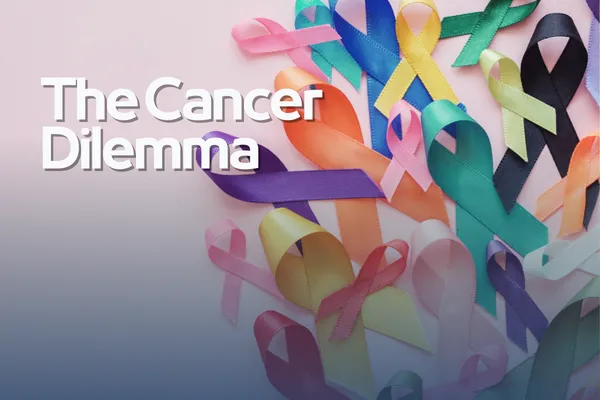
Questions? Give us a call

The Cancer Dilemma
The dreaded 'c' word. No not that word. Cancer.
Just about everyone has had experience with this terrible disease. Whether themselves or a loved one suffering through grueling treatment, agonizing testing, stress and depression, and all that goes with such a terrifying diagnosis. I have lost two grandparents to stage 4 lung cancer on my dad's side of the family and my grandfather on my mom's side currently has prostate cancer.

I have noticed an uptick in cancer patients coming into our insurance practice lately. I have even recently lost a longtime client to his battle with cancer. I have had cancer on my mind quite a bit lately.
For those who are survivors congratulations on fighting and winning such a hard battle. To those who have just been diagnosed or are currently waiting for a diagnosis, or have been battling for some time now just know that cancer is beatable. A lot of people have beat cancer so don't give up and please get the treatment you need, because it could be life or death. I'm cheering for you.
According to the American Cancer Society, 1.9 million cases of new cancer are expected to be diagnosed in 2021. 608,570 Americans are expected to die of cancer in 2021. 608,570. That is mind-blowing. Cancer is the second most cause of death in the United States after heart disease. It is believed that a substantial amount of cancer deaths can be preventable.
What about the costs of cancer?
The costs of cancer can be measured directly, by medical co-pays, co-insurance, and deductibles as well as indirectly, by costs of traveling to treatments, hotel rooms, loss or reduction of income while receiving treatments, and the incalculable cost of suffering and stress. The costs of treatment often leave people with mounting debts and often lead to financial hardships.
According to the Journal of Clinical Oncology, 16% of cancer patients will quit their treatment plans because they cannot afford the costs of their treatment plan and 42% of people are more likely to skip some treatments if they have a co-pay. It is a fact that a cancer patient is 2.5x to 3x more likely to go bankrupt than a person without cancer. According to AARP those who declare bankruptcy are 80% more likely to die from cancer. These statistics are alarming! There is a direct correlation between being able to pay for your care and survival.
Doctors find themselves wondering why treatment plans are not working for their patients only to find out that the patient is missing treatments due to financial constraints or not completing treatments at all. 11 of the 12 FDA-approved cancer medications cost over $100,000 annually and the costs just continue to rise yearly. Medical inflation outpaces normal economic inflation by more than 3x. Also as individuals age the ability to absorb such massive costs decreases.
Is cancer treatment covered by insurance?
Sometimes it can be, most of the time medical insurance isn't enough. 54% of costs associated with cancer are non-medical and therefore not covered by medical insurance.
Even with medical insurance, the costs of these medications can be financially crippling. There has been a shift to more doctors using oral medications as opposed to chemotherapy and radiation treatments and it appears to be having success and more people are surviving. The only problem is that oral medications are a more costly treatment therapy, so more people are struggling to get the treatments, and more of the expenses fall on the patient than the insurance company.
Sometimes medical insurance will not cover certain treatment strategies, such as 'experimental treatments' which multiple treatment options can be classified as. Over half of all medical expenses for a cancer patient is not paid through medical insurance but out of the pocket of the patient. Because of medical insurance not covering all of the costs associated with cancer we are seeing cancer insurance policies becoming more common.
You can also run into an issue such as out of network providers. Many people who want to seek help from a notable oncologist or treatment centers may be faced with network problems and insurance denying claims.
With that being said medical insurance is extremely crucial to someone dealing with a major diagnosis. As I mentioned earlier in this article, the ability to pay for your care could have a direct correlation to your survival rate.
Is there any policy for cancer patients?
There are some resources available to help. Sometimes prescription discounts or charitable grants can help reduce some of your costs. This will still be an expensive bill in many cases. Some people may qualify for government grants, but not everyone. Fortunately, there is an option through insurance companies to help alleviate the financial burden of cancer and that would be to purchase a cancer insurance policy. It is designed to work in conjunction with your medical insurance. And the crazy part is, they are affordable plans!
There are different types of cancer policies such as lump sum, meaning if you are diagnosed you get a check paid out to you to use for whatever expenses you need. You can purchase a $10,000 to $100,000 policy. There are indemnity cancer plans, which usually pay per day, per occurrence, or per year. There are options to help mitigate the risks people face with cancer treatments to allow people to be able to get the treatment they need.
You can also insure children. As a mom of two little girls, it is so incredibly hard to think about a child facing cancer but unfortunately, it happens. A parent can ensure their child gets proper treatment while minimizing the damage to their financial wellbeing at the same time. Ultimately when you, your child, or your loved one is facing cancer recovery and well-being should be your primary focus, not financial burdens. I pay less than $5 per month to make sure my girls have cancer coverage.
It is important to find a cancer plan that will fill in the gaps of your medical insurance. Some things the money could be used for would be:
Doctor visits.
Hospital stays.
Prescription drugs.
Chemotherapy.
Radiation.
X-rays.
Surgery.
Private Nursing costs.
Blood transfusions.
Ambulance rides.
Transportation.
Hotel room for family accommodations.
Loss or replacement of income.
Mounting debt/ medical bills.
Can you get cancer insurance if you have cancer?
The ideal time to get any insurance plan is when you are healthy. The point of the cancer policy is to help reduce some or all of the financial burden of cancer, but you cannot get a cancer policy if you are diagnosed with cancer. The policy has to be in place before the diagnosis for it to pay out benefits.
Critical Illness
Another option is to buy a critical illness policy that can protect again heart attack, stroke, and cancer. Heart-related deaths are #1, cancer is #2, and strokes are the #3 cause of death in the United States. You could look at a policy to protect against all three.
What if I have a cancer policy and didn't make a claim?
Make a claim now! Some policies will have requirements that you have to claim within a certain time period, but I have seen people file for a claim 12 years after they had cancer, and the policy paid out. If you have a policy in place there is nothing you can hurt by attempting to get the money you deserve. The worst thing the insurance company can do is deny the claim because you waited too long.
Need help?
For those struggling with cancer, the American Cancer Society has some resources to help, such as understanding your diagnosis, how to cope, and how to talk to people about your diagnosis. You don't have to go through it alone, there are so many resources and groups available if you don't have a strong support system in your life. One of the many problems people face with cancer is loneliness and depression. Please seek help if this applies to you.

Safeguard Insurance, LLC
Copyright 2022 -- All Rights Reserved
Insuring your health, life, and retirement.
Phone: 270-904-6070
Email: education@safeguardky.com
1600 Scottsville Rd, Suite 100
Bowling Green, KY 42104
The information presented on this website is for informational or illustrative purposes only. Safeguard Insurance is operated by licensed insurance agents who can help you enroll in an insurance policy. Safeguard Insurance, and any agents or employees, are not affiliated with or endorsed by the United States government, Medicare, or the Social Security Administration. We do not offer every plan available in your area, and any information we provide is limited to those plans we do offer in your area. Please get in touch with Medicare.gov or 1-800-MEDICARE to get information on all your options. When you request to be contacted about Medicare Advantage, Medicare Part D, or Medicare Supplement plans, you acknowledge that a licensed insurance agent may contact you by phone, email, mail, or in-person to offer additional assistance or to discuss all your Medicare health insurance options.
Safeguard Insurance provides content (via blog posts, YouTube videos, podcasts, eBooks, and any other manner) as a service to its readers. Safeguard Insurance does not offer legal or tax advice. Safeguard Insurance cannot guarantee the accuracy or suitability of our content for a particular purpose without a full and thorough fact finder. We are not responsible for any actions taken by users.







